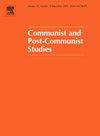20世纪60年代捷克斯洛伐克的谨慎行为革命
IF 1.3
4区 社会学
Q3 INTERNATIONAL RELATIONS
Communist and Post-Communist Studies
Pub Date : 2021-06-01
DOI:10.1525/J.POSTCOMSTUD.2021.54.1-2.196
引用次数: 0
摘要
这篇文章讨论了迄今为止未被注意到的所谓布拉格之春的“知识起源”。它总结了行为革命在社会科学领域的原则,并记录了它对捷克斯洛伐克学者的巨大影响。从20世纪60年代中期开始,行为推理与其他(相互冲突的)观点共存。关于捷克斯洛伐克改革的文献证明了马克思修正主义、法兰克福学派和工业社会理论的影响。本文强调行为元理论不仅在学术界,而且在政治舞台上的意义。然而,1968/1969年之后的正常化进程标志着这种范式不可避免的结束。本文章由计算机程序翻译,如有差异,请以英文原文为准。
Czechoslovakia’s Discreet Behavioral Revolution in the 1960s
This article deals with the thus far unnoticed “intellectual origin” of the so-called Prague Spring. It summarizes tenets of behavioral revolution in the field of social sciences and documents its considerable influence on Czechoslovak scholars. From the mid-1960s, behavioral reasoning coexisted with other (mutually conflicting) perspectives. Literature on Czechoslovak reform has given evidence of the impact of Marxian revisionism, the Frankfurt school, and theories of industrial societies. This article stresses the significance of behavioral meta-theory not only in academia but also in the political arena. However, the process of normalization after 1968/1969 signified the inevitable end for this paradigm.
求助全文
通过发布文献求助,成功后即可免费获取论文全文。
去求助
来源期刊

Communist and Post-Communist Studies
Multiple-
CiteScore
1.90
自引率
0.00%
发文量
23
期刊介绍:
Communist and Post-Communist Studies is an international journal covering all communist and post-communist states and communist movements, including both their domestic policies and their international relations. It is focused on the analysis of historical as well as current developments in the communist and post-communist world, including ideology, economy and society. It also aims to provide comparative foci on a given subject by inviting comments of a comparative character from scholars specializing in the same subject matter but in different countries.
 求助内容:
求助内容: 应助结果提醒方式:
应助结果提醒方式:


